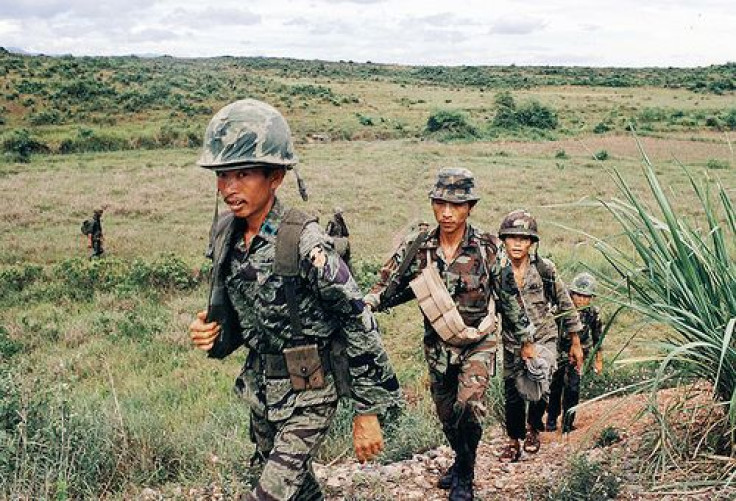Vietnamese Soldier Has Arm Bones Returned After 47 Years; American Doctor Kept Amputated Limb As Reminder Of A Good Deed Done

Nguyen Quang Hung's arm was the color of an eggplant when he first saw Dr. Sam Axelrad. It was the fall of 1966 and Hung's arm was badly infected. He had been shot by American soldiers roughly 46 miles from his current home in central Vietnam. Forty-seven years later and the very arm Axelrad had amputated just above the elbow was now being gifted to its rightful owner.
Axelrad, a 27-year-old military doctor at the time, decided to preserve the amputated limb as a personal reminder that he'd done a good deed in helping an enemy soldier. After his medic colleagues boiled off the arm's flesh, Axelrad took the arm, which he housed in a military bag, back to his home in Texas. He stored it in a closet, and that's where it stayed for the next several decades.
Finally, in 2011 he decided to confront the memories.
"It just blew me away what was in there," Axelrad told the AP at a hotel bar in Hanoi early Sunday, hours after arriving in Vietnam with his two sons and two grandchildren on Saturday evening. "That kind of triggered my thoughts of returning."
Vacationing in Vietnam with his family last summer, the Houston urologist reckoned Hung would most likely be found near where he grew up, in northern Vietnam — if he were alive, that is. Axelrad didn't know for sure.
"IT'S JUST TIME FOR CLOSURE"
The dominoes started to fall when Axelrad met a tour guide named Tran Quynh Hoa, who also worked as a Vietnamese journalist for one of the country's most widely read newspapers. Hoa took an interest in Axelrad's war stories and soon learned of the doctor's quest to reunite the severed arm with its owner. Hoa's story eventually made its way around the country, eventually falling into the hands of Hung's brother-in-law in Ho Chi Minh City.
The editors of the newspaper soon got a phone call.
Hoa, now a communications officer for the International Labour Organization, arranged Monday's reunion in An Khe, near the coastal city of Qui Nhon, according to the AP.
"It's just time for closure," Axelrad said a day before the meeting.
After being shot in his right arm, Hung, now 73, floated down a stream to avoid a potential firefight. He found shelter in a rice warehouse, where the gunshot wound grew more infected as the days passed. Without help, Hung knew his chance of survival was slim.
Three days later, an extremely sick Hung was evacuated by a U.S. helicopter to a military hospital in Phu Cat, in central Binh Dinh province. He knew the American soldiers would decide his fate.
"When I was captured by the American forces, I was like a fish on a chopping-board," Hung said last week. "They could have either killed or spared me."
But Axelrad never had such grave plans for Hung. He sought to treat the wound, which he knew would kill Hung without the proper remedy.
"He probably thought we were going to put him in some prisoner-of-war camp," said Axelrad, who, with the help of his medic team, treated Hung for the next eight months. Hung then assisted the soldiers for another six months after his recovery. "Surely he was totally surprised when we just took care of him."
FORMER ENEMIES REUNITED
Hung was admittedly just as surprised when he learned Hoa, the journalist who had written about Axelrad's quest, had arranged a meeting between the once-enemies. Axelrad arrived in Hung's home in An Khe on Monday. Hoa served as an interpreter between the two vets.
"I can't believe that an American doctor took my infected arm, got rid of the flesh, dried it, took it home and kept it for more than 40 years," he said by telephone last week from his home. "I don't think it's the kind of keepsake that most people would want to own. But I look forward to seeing him again and getting my arm bones back."
When Axelrad arrived, the two behaved as if the immense weight of the war's history had vanished. They met each other's children, grandchildren, and joked about who was better looking back when they had their first encounters. The two ate lunch in Hung's home.
Nearly two years after opening the closet in 2011, Axelrad appeared content in finding closure. "I'm so happy that he was able to make a life for himself," he said.
Hung, too, expressed joy in obtaining his lost limb — for himself, and also for his fellow soldiers.
"I'm very glad to see him again and have that part of my body back after nearly half a century," Hung said by telephone Monday after meeting Axelrad. "I'm proud to have shed my blood for my country's reunification, and I consider myself very lucky compared with many of my comrades who were killed or remain unaccounted for."



























